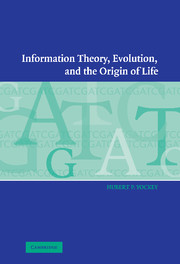Book contents
- Frontmatter
- Contents
- Preface
- 1 The genetic information system
- 2 James Watson, Francis Crick, George Gamow, and the genetic code
- 3 The Central Dogma of molecular biology
- 4 The measure of the information content in the genetic message
- 5 Communication of information from the genome to the proteome
- 6 The information content or complexity of protein families
- 7 Evolution of the genetic code and its modern characteristics
- 8 Haeckel's Urschleim and the role of the Central Dogma in the origin of life
- 9 Philosophical approaches to the origin of life
- 10 The error catastrophe and the hypercycles of Eigen and Schuster
- 11 Randomness, complexity, the unknowable, and the impossible
- 12 Does evolution need an intelligent designer?
- 13 Epilogue
- Mathematical appendix
- Glossary
- References
- Index
Mathematical appendix
Published online by Cambridge University Press: 15 August 2009
- Frontmatter
- Contents
- Preface
- 1 The genetic information system
- 2 James Watson, Francis Crick, George Gamow, and the genetic code
- 3 The Central Dogma of molecular biology
- 4 The measure of the information content in the genetic message
- 5 Communication of information from the genome to the proteome
- 6 The information content or complexity of protein families
- 7 Evolution of the genetic code and its modern characteristics
- 8 Haeckel's Urschleim and the role of the Central Dogma in the origin of life
- 9 Philosophical approaches to the origin of life
- 10 The error catastrophe and the hypercycles of Eigen and Schuster
- 11 Randomness, complexity, the unknowable, and the impossible
- 12 Does evolution need an intelligent designer?
- 13 Epilogue
- Mathematical appendix
- Glossary
- References
- Index
Summary
Socrates:… You go entirely by what looks probable, without a word of argument or proof. If a mathematician like Theodorus elected to argue from probability in geometry he wouldn't be worth an ace. So you and Theodorus might consider whether you are going to allow questions of this importance to be settled by plausible appeals to mere likelihood.
Plato, (428–348 b.c.), Theaetetus p 868 Plato, translated by Francis M. Cornford, Oxford University PressDer liebe Gott würfelt nicht mit der Welt.
(The dear God does not play dice with the world. Albert Einstein in a conversation on quantum theory with Niels Bohr.)The origins and interpretation of probability
The origin of the primitive ideas of chance and uncertainty seems to be lost in history. Chance and uncertainty were poetically personified in the Greek pantheon by the goddess Tyche. The Romans borrowed her and renamed her Fortuna. The Fates, three goddesses who controlled human life, no doubt were more ancient. They were Clotho, who spins the thread of life (now known to be DNA); Lachesis, who casts lots to determine how long life shall be; and Atropos, who cuts the thread of life. These goddesses are sometimes referred to collectively and pejoratively as “blind chance” or “mere chance.” They may be called vindictive, callous, cruel and fickle, but not blind (see gambler's ruin; Feller, 1968).
In our sophisticated modern world, we still cast lots to determine events, especially those in which we wish to avoid responsibility.
- Type
- Chapter
- Information
- Information Theory, Evolution, and the Origin of Life , pp. 191 - 212Publisher: Cambridge University PressPrint publication year: 2005



